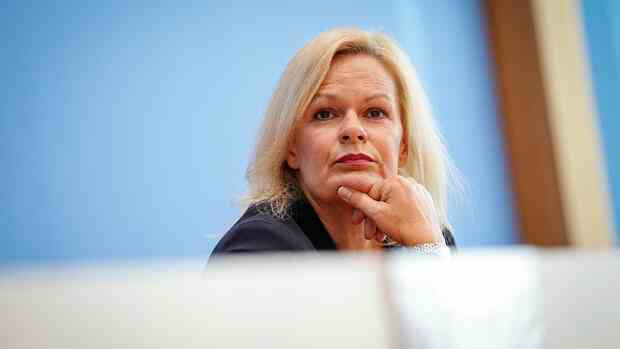Berlin Shortly before the refugee summit announced by Federal Interior Minister Nancy Faeser (SPD), Bavaria’s Interior Minister Joachim Herrmann (CSU) called for tougher action in the case of illegal entry by refugees. “I finally expect action to limit illegal immigration,” Herrmann told the Handelsblatt.
He accused Faeser of contradictory action on the subject. At her first migration summit in October, the minister spoke out in favor of a “limitation”, but then “started new admission programs”. An “unmistakable signal” is now necessary that there are no more additional recording programs.
Faeser had already met with state and local government representatives for a top-level meeting on the topic of refugees in October. At that time she stated that more people were coming via the Mediterranean and the Balkans route and that there was a higher number of illegal entries and asylum applications. “That’s why we have to ensure a clear limit,” promised the minister.
Faeser wants to receive representatives of the conference of interior ministers and the municipal umbrella organizations in Berlin in the morning to talk about the refugee situation. One of the topics there should be the limitation of illegal migration to Germany. “But we also have too few deportations by the responsible federal states,” Faeser admitted at the weekend.
Baden-Württemberg’s Migration Minister Marion Gentges (CDU) is now demanding concrete measures here. The traffic light announced a repatriation offensive in order to consistently expel offenders and dangerous people in particular. “That has to happen now, too,” Gentges told the Handelsblatt.
Almost 47 percent more people seeking protection than in 2021
Above all, “effective” repatriation agreements with important countries of origin are required for this. “It is unacceptable for the Federal Minister of the Interior to oppose a proposal at EU level to persuade countries of origin to cooperate and readmit their nationals via visa conditions,” added the minister.
>> Read here: Where refugees come to Germany from – the most important facts in eleven graphics
The Federal Government’s new special representative for migration agreements, Joachim Stamp, is responsible for repatriations. The FDP politician recently campaigned for migration agreements with partner countries that should be offered a contingent of regular German visas for their citizens – on the condition that they take back citizens who have entered Germany illegally, i.e. enable deportations.
In Germany, more people applied for asylum last year than at any time since 2016. According to annual statistics from the Federal Office for Migration and Refugees (BAMF), almost 218,000 people made such a request for protection in Germany for the first time. That was almost 47 percent more than in 2021.
Refugee accommodation in the Main-Taunus district: “It’s a call for help”
The approximately one million war refugees from Ukraine who came to Germany last year did not have to apply for asylum. You receive immediate temporary protection on the basis of an EU directive.
In view of the situation, the municipalities believe that more support from the federal government is essential. “The districts have reached the limits of their capacity and need a perspective on the refugee issue,” said the President of the District Council, Reinhard Sager, to the Handelsblatt. This includes, for example, the complete assumption of the accommodation costs for recognized refugees.
SPD: “We have to support the municipalities more”
Baden-Württemberg’s Migration Minister Gentges also called for a greater federal contribution to the refugee costs. The federal government assigns the refugees to the states, who ultimately have to be accommodated in the municipalities. “Then the federal government must also take responsibility,” said the CDU politician. “This also applies to the follow-up costs, for example when building housing or for kindergarten and school places.”
Bavaria’s Interior Minister Herrmann warned: “Somehow muddling through is no longer possible.” In view of the additional costs for schooling, for childcare, for people in need of care, he considers further federal aid of eight billion euros to be appropriate.
>> Read also: Because of refugees at the limit: How a call for help from Hesse went unheard
The CSU politician criticized the fact that the federal government is only making 2.75 billion euros available for all federal states this year. He expects costs of at least 1.5 billion euros for Bavaria alone.
The SPD was open to helping the municipalities more. “They are generally underfunded,” said the migration policy spokesman for the parliamentary group, Lars Castellucci, to the Handelsblatt. The investment backlog amounts to 160 billion euros.
“That’s why it’s not just about housing refugees, but more generally about the financial relationship between the federal, state and local governments,” emphasized Castellucci. “We need to support the municipalities more. Everything that happens somewhere politically goes down well with them.”
However, Federal Finance Minister Christian Lindner (FDP) has recently dampened the expectations of the federal states and municipalities in terms of higher federal subsidies for refugee costs. A spokesman for Faeser’s ministry was also cautious about further support from the federal government.
More: The EU wants to increase the number of deportations
